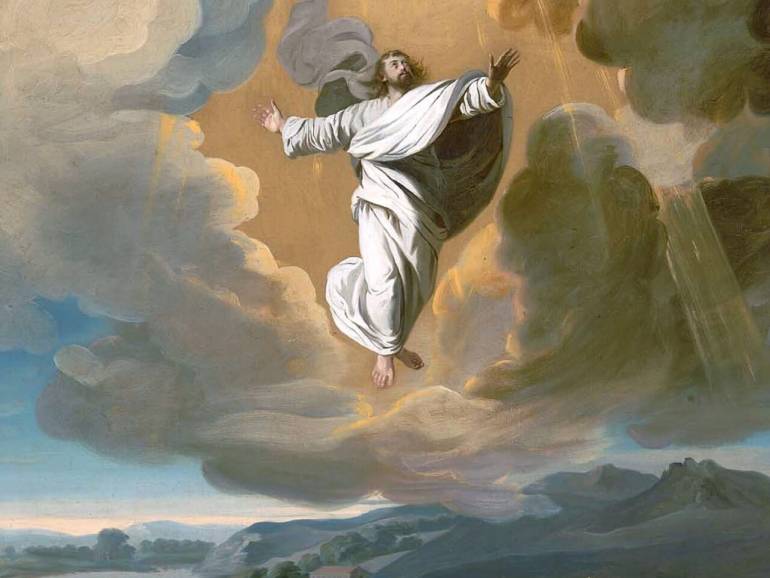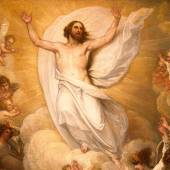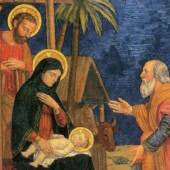God is always with us

On the seventh Sunday of Easter, the Church generally celebrates the Feast of the Ascension of the Lord (otherwise on Thursday of the 6th Easter Sunday, 18th May).
It is a reminder that all is not lost with the death of Jesus. He rises. He appears to his friends for forty days and speaks to them about the Kingdom of God. Today he ascends to heaven after promising them to send the Holy Spirit.
The Church must look for fresh beginnings. The ascension of Jesus is a reminder that “our citizenship is in heaven” (Phil 3:20) and “citizens with the saints and also members of the household of God” (Eph 2:19).
Jesus in heaven is not a God who is cut off from the rest of the world and is not interested in what is happening in this world. He is a God who is not only transcendent but also imminent.
The First Reading from the Acts of the Apostles, or the Acts of the Holy Spirit, is a bridge between the Gospel of Luke (the first volume narrates all that Jesus did and taught from the beginning; it looks back at Jesus’ ministry) and the Acts (the second volume presents the mission expansion; it looks forward to the mission of the disciples).
The time has come for Jesus to ascend to his Father. He has to go. His departure is necessary for the disciples to carry forward the missionary mandate.
After witnessing ascension, the disciples must stay put in Jerusalem, waiting for the Holy Spirit, and be baptized with the power of God. The time of waiting is a time of prayer and a time of expectant hope. The disciples are to become witnesses everywhere and to the ends of the earth.
Thus the disciples become the first witnesses of his ascension. Jesus is taken up beyond the clouds. The clouds are the dwelling places of our God. The two men in white robes assure the Twelve that parousia is around the corner. Jesus will come down as he went up to the Father.
The Responsorial Psalm repeatedly expresses our God's kingship and celebrates His glory. God’s glory is God’s presence. He is the King of the Universe. He sits on His holy throne.
The church has deliberately chosen this Psalm today because of v. 5, which says, “God has gone up with a shout, the Lord with the sound of a trumpet.” It indicates Jesus’ ascension. As human persons, our pride and privilege incessantly sing praises to our God.
The Second Reading from St. Paul’s Letter to the Ephesians finds Paul in prayer. He prays to God that He may grant the Ephesians a spirit of wisdom and revelation, open their hearts' eyes, and enlighten them. We cannot know God with our shallow eyes and minds. The heart knows God better. We need to awaken the eyes of the heart.
They are the spiritual eyes. The author reveals that God raised Jesus from the dead and seated him at His right hand in the heavenly places (v. 20). Thus, he bears witness to Jesus’ ascension. The Psalm portrayed God as a King, while this passage projects Jesus as a King with authority, power, and dominion. And thus acknowledges Jesus as the head of the Church, which is the body.
The Gospel Reading presents Jesus and the Eleven on a mountain in the Galilean region. It is a theological composition based on the Galilean ministry of Jesus. The author of the third Gospel will locate the mountain of ascension between Bethany and the Mount of Olives in Jerusalem as per the structure of his Gospel.
The disciples are gathered according to the direction given to them. All of them saw Jesus in his resurrected body. Some worshiped him. Some doubted him (This is what continues to happen today).
Jesus claims to have authority in heaven and earth. That is what Paul was trying to say in the 2nd Reading. The command of Jesus to his disciples at the time of ascension, namely departure to heaven, consists of the following:
The disciples are (i) to go, (ii) to make disciples of all nations, (iii) to baptize them, and (iv) to teach them to obey everything that Jesus has commanded.
Jesus assures us that he is always with us, his people, till the end of the age. The celebration of Ascension invites us to make disciples of all nations, baptizing them and teaching them to obey all that Jesus commanded.
Radio Veritas Asia (RVA), a media platform of the Catholic Church, aims to share Christ. RVA started in 1969 as a continental Catholic radio station to serve Asian countries in their respective local language, thus earning the tag “the Voice of Asian Christianity.” Responding to the emerging context, RVA embraced media platforms to connect with the global Asian audience via its 21 language websites and various social media platforms.












